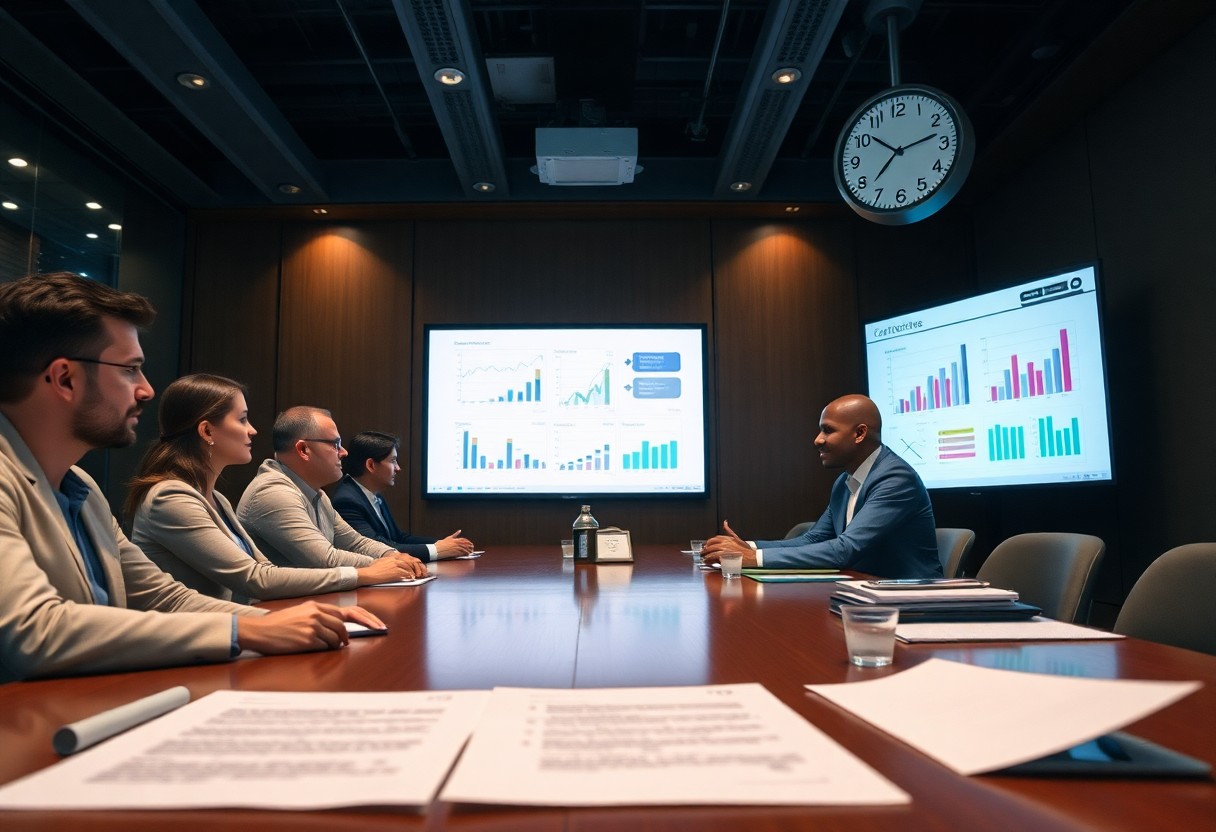Over the course of your sales career, honing your negotiation skills can be the differentiator that propels you to success. Effectively navigating negotiations allows you to build rapport with clients while driving towards favorable outcomes. In this blog post, you’ll discover various techniques to expedite the closing process, enhancing both your conversion rates and client satisfaction. It’s time to empower yourself with strategies that not only accelerate deal closure but also foster lasting relationships. Let’s examine into practical methods that can transform your sales approach.

Understanding Negotiation
Your journey into the world of sales negotiation begins with a solid grasp of what negotiation actually entails.
Definition and Importance of Negotiation
Understanding negotiation means recognizing it as the art of reaching an agreement that satisfies all parties involved. In sales, this skill is vital, as it determines how effectively you can secure a deal while maintaining relationships with clients.
Common Misconceptions About Negotiation
An effective negotiation is often misperceived as a battle where one side wins at the expense of the other.
Common misconceptions suggest that successful negotiators are aggressive or manipulative. In reality, effective negotiation is about *collaboration* and *mutual benefit*. It involves understanding the needs and desires of the other party and finding a middle ground. You should aim for solutions that foster long-term partnerships rather than temporary wins.
The Role of Negotiation in Sales
Negotiation plays a fundamental role in sales as it allows you to tailor your offerings to meet the specific needs of your clients.
Definition of negotiation in sales emphasizes its function in closing deals. It allows you not only to present your product effectively but also to engage in a dialogue that uncovers *client objections* and *desires*. The art lies in addressing those concerns while aligning your goals with theirs, thereby enhancing the likelihood of a successful transaction and encouraging future collaboration.
Preparation: The Key to Successful Negotiation
If you want to excel in negotiation, preparation is your strongest ally. The better prepared you are, the more confident you’ll feel, allowing you to navigate discussions smoothly and effectively. A thorough understanding of your client, clear objectives, and a strong value proposition will set you apart in the competitive world of sales.
Researching Your Client
Client research is important for successful negotiations. Knowing your client’s background, needs, and pain points enables you to tailor your approach, allowing you to create solutions that resonate with them directly. This personal touch can foster trust and rapport.
Setting Clear Objectives
An effective negotiation starts with clear objectives. Establish what you aim to achieve from the negotiation process. Setting specific, measurable goals will help you stay focused and guide your discussions towards desired outcomes.
To further enhance your success, ensure that your objectives include the minimum acceptable terms you’re willing to accept as well as your ideal outcome. This clarity will empower you to adapt your strategies as discussions evolve, keeping you on track to achieve your goals.
Identifying Your BATNA (Best Alternative to a Negotiated Agreement)
After defining your objectives, it’s important to identify your BATNA. This is your fallback option if negotiations do not go as planned. Knowing your best alternative helps you gauge when to walk away from a deal that doesn’t meet your needs.
For instance, if a client’s offer falls short of your expectations, understanding your BATNA provides you with leverage. You will feel more empowered to negotiate effectively, having a clear understanding of what you could pursue instead—whether it’s another client or a different product offering.
Crafting Your Value Proposition
About your value proposition, it’s crucial to articulate what makes your product or service stand out. A strong value proposition clearly communicates the unique benefits your solution provides, helping your clients understand why they should choose you over competitors.
Due to its importance, you should invest time in crafting a compelling narrative that aligns your offer with the specific needs of your client. Highlight the tangible benefits your solution offers, such as cost savings, increased efficiency, or enhanced performance, making it easier for clients to envision the value you bring.

Building Rapport and Trust
All successful sales negotiations hinge on one key element: rapport and trust. To explore Sales negotiation skills and strategies to win more deals, you’ll find that establishing a solid relationship with your clients can significantly influence the outcome. When they trust you, they are more likely to be open and receptive, ultimately leading to a smoother closing process.
The Importance of Relationships in Sales
To foster long-lasting client relationships, you need to cultivate an environment where open communication thrives. Strong relationships can lead to better negotiations, as clients feel comfortable sharing their needs and concerns. This connection transforms the sales process into a partnership, making it easier for you to identify and address their needs.
Techniques for Establishing Trust Quickly
Above all, establishing trust quickly is crucial for effective sales negotiations. You can accomplish this by demonstrating genuine interest in your clients and offering valuable insights. Be transparent about your intentions and ensure that your actions align with your words. This consistency builds a reliable foundation upon which trust can be established.
In addition, using positive body language, maintaining eye contact, and mirroring your client’s demeanor can help strengthen the bond. A simple yet warm greeting can make a significant difference. Show that you care deeply about their concerns by providing tailored solutions that cater to their unique needs while being patient and approachable.
Active Listening Skills
On this journey to build trust, honing your active listening skills is crucial. Focus on understanding your client’s perspective rather than just waiting for your turn to speak. When you genuinely listen, it conveys respect and shows that you value their opinions.
Trust begins with your ability to actively listen. By concentrating on what your client is saying and asking follow-up questions, you signal that you are invested in the conversation. This not only makes your clients feel appreciated but also allows you to uncover their true desires and pain points, enabling you to find solutions that resonate. Moreover, recognizing non-verbal cues adds another layer to your understanding, enhancing your overall communication effectiveness.
Effective Communication Strategies
To successfully master negotiation in sales, you must understand the importance of effective communication strategies. This involves not only conveying your message clearly but also listening actively to your counterpart. When your communication is streamlined, you are more likely to facilitate trust and reach an agreement swiftly.
Verbal and Nonverbal Communication in Negotiation
Among the many layers of communication, both verbal and nonverbal cues play critical roles in negotiation. Your tone of voice and choice of words can significantly affect the outcome. Simultaneously, body language and facial expressions can enhance or undermine the message you intend to convey, making it crucial to align both forms for maximum effectiveness.
The Art of Persuasion
After establishing a rapport, mastering the art of persuasion is your next step. This entails not only presenting your ideas compellingly but also understanding your counterpart’s needs and motivations. By appealing to their interests, you can significantly increase your chances of achieving a successful outcome.
Due to the highly competitive nature of sales, being persuasive requires skill and practice. You should aim to connect emotionally while reinforcing the benefits of your proposal. Techniques such as storytelling can enable you to engage your audience and illustrate the value of what you’re offering, making it easier for them to see the big picture and be persuaded.
Timing and Delivery of Your Pitch
Before making your pitch, knowing the right timing and delivery can be the difference between closing a deal or losing it. When you present your proposal at the right moment, it increases the chances of your audience being receptive to your message.
In addition, the emphasis you put on different aspects of your pitch can significantly affect its impact. Using pauses strategically can allow your audience to absorb the information, creating anticipation and heightening their interest. Tailor your delivery to the atmosphere of the negotiation – whether formal or informal – to enhance your effectiveness.
Questioning Techniques for Insight
Below the surface of any negotiation lies valuable insight that can be uncovered through thoughtful questioning. By asking open-ended questions, you encourage dialogue and gain a deeper understanding of your counterpart’s needs and pain points.
In fact, employing questioning techniques not only reveals crucial information but also demonstrates your genuine interest in their perspective. This collaborative approach fosters a constructive atmosphere, allowing you to address concerns more effectively. By incorporating insightful questioning into your negotiation strategy, you can position yourself as a partner rather than just a salesperson, leading to faster deal closures.

Tactics for Closing Deals
Once again, the art of negotiation plays a significant role in successfully closing deals faster. By employing specific tactics, you can enhance your ability to guide potential clients toward a positive purchasing decision. Let’s explore some strategies that will empower you in the closing phase of sales.
Recognizing Buying Signals
By tuning into buying signals, you can gauge a prospect’s readiness to make a purchase. Look for verbal and non-verbal cues such as nodding, asking about pricing, or discussing implementation. These indicators suggest that your prospect is moving closer to a commitment.
Overcoming Objections
After identifying objections, your next step is to skillfully address them. Listen carefully to your prospect’s concerns and respond with tailored solutions that alleviate their doubts. Engaging in this dialogue helps to build trust and shows that you value their perspective.
This process of overcoming objections is vital for maintaining rapport with your clients. When you confront their concerns directly and provide satisfactory answers, you not only strengthen the relationship but also pave the way for closing the deal. Being empathetic and understanding can effectively turn hesitations into a firm commitment.
Closing Techniques: Direct vs. Indirect Approaches
To close a deal effectively, you can choose between direct and indirect approaches based on your prospect’s personality and the context of the conversation. Directly asking for the sale can work wonders with straightforward clients, while subtle nudges may suit those who need more time.
In fact, aligning your closing technique with your prospect’s communication style can dramatically enhance your success rate. While direct approaches can lead to rapid closures, indirect methods allow for more exploration of a prospect’s feelings, making them feel valued and understood. Adapting your approach in real-time is a skill worth mastering.
The Importance of Summarizing Key Points
Points emphasized during your conversation can significantly influence the closing process. By recapping the main benefits and addressing concerns before asking for the sale, you reinforce the value your solution provides.
Indeed, summarizing key points is an effective way to remind the prospect of their needs and how your offering meets them. This closure technique not only clarifies the conversation but also reaffirms your alignment with their goals, making it easier for them to say “yes.” This reinforcement builds confidence in the decision they’re about to make.
Post-Negotiation Strategies
Despite the tension that can accompany negotiations, the period following a deal is just as important as the negotiation itself. How you approach the aftermath can significantly impact your future relationships and results. Strategic post-negotiation actions help solidify agreements and foster long-term partnerships.
Following Up with Clients
Around 24 to 48 hours after closing a deal, make sure to reach out to your clients. This timely follow-up is crucial for reinforcing the commitment made during negotiations and demonstrating your dedication to their satisfaction. It provides an opportunity to address any immediate concerns and to affirm their decision to work with you.
Evaluating the Negotiation Process
On the other hand, evaluating the negotiation process itself is key for your growth. This analysis should focus on the strategies used, the outcomes achieved, and areas that might require improvement in future discussions.
And by conducting a thorough evaluation, you will gain valuable insights into what worked well and what didn’t. Consider factors such as the strategies employed, communication styles, and responses from the other party. Recognizing patterns can improve your negotiation skills and equip you for future successes, enhancing your overall effectiveness in closing deals.
Learning from Feedback for Future Negotiations
After each negotiation, seek feedback not only from your clients but also from your team. Constructive input can help refine your skills and strategies, ensuring you’re better prepared in the future.
Consequently, integrating feedback into your negotiation process creates a cycle of continuous improvement. Analyzing what went well and what fell short helps you adapt your approach, ensuring you’re always moving towards achieving better outcomes and nurturing productive professional relationships.
Building Long-term Relationships
Between negotiations, it’s vital to focus on building strong relationships that can extend beyond a single deal. Engaging with your clients through regular communication fosters trust and loyalty, which can be incredibly beneficial in future negotiations.
Further investment in these relationships can lead to a network of repeat business and referrals. By showing that you value their partnership through ongoing engagement, you establish a foundation where negotiations become less about haggling and more about mutually beneficial collaboration.
To wrap up
Upon reflecting on the strategies outlined in ‘Mastering Negotiation in Sales – Techniques for Closing Deals Faster’, you can enhance your ability to negotiate effectively and close deals with confidence. By applying these techniques, you will not only improve your sales outcomes but also build stronger relationships with your clients. Embrace these principles, practice diligently, and watch as your negotiation skills elevate your success in the competitive world of sales.
FAQ
Q: What is the primary focus of ‘Mastering Negotiation in Sales – Techniques for Closing Deals Faster’?
A: The primary focus of this resource is to equip sales professionals with effective negotiation techniques. It emphasizes strategies that improve communication, build relationships, and ultimately expedite the deal-closing process, ensuring that sales representatives can confidently navigate negotiations.
Q: Who can benefit from the techniques taught in this program?
A: The techniques are designed for a wide range of professionals including sales representatives, account managers, business development executives, and anyone involved in negotiations. Both newcomers and seasoned professionals looking to refine their skills can find valuable insights in this material.
Q: Are there specific negotiation strategies highlighted in the course?
A: Yes, the course covers various negotiation strategies such as the importance of active listening, understanding buyer psychology, effective questioning techniques, and the art of framing proposals. It also researchs into methods for building rapport and creating win-win situations.
Q: How can I apply what I learn in this program to real-life sales scenarios?
A: The program includes practical exercises and role-playing scenarios that allow participants to apply learned strategies in realistic environments. Participants are encouraged to practice these techniques in actual sales meetings, thereby integrating theoretical knowledge with practical application.
Q: Is there a specific focus on closing techniques in the program?
A: Absolutely. The program places a strong emphasis on closing techniques. It provides actionable insights on recognizing closing signals, addressing objections effectively, and creating a sense of urgency that encourages clients to finalize deals.
Q: How long does it take to see results after implementing these techniques?
A: The timeline for results can vary depending on individual circumstances and market dynamics. However, many participants report noticeable improvements in their negotiation skills and overall sales performance within a few weeks of implementing the techniques taught in the course.
Q: Is this program suitable for online learning or only in-person sessions?
A: The program is designed to be flexible and is available for both online learning and in-person workshops. This allows participants to choose the format that best suits their learning style and schedule, ensuring accessibility for a broad audience.


![10 Must-Have AI Tools for Startups & Small Businesses [2026]](https://smartgeekguide.com/wp-content/uploads/2025/10/top-10-ai-tools-for-startups-2026-xmg-360x240.jpg)






